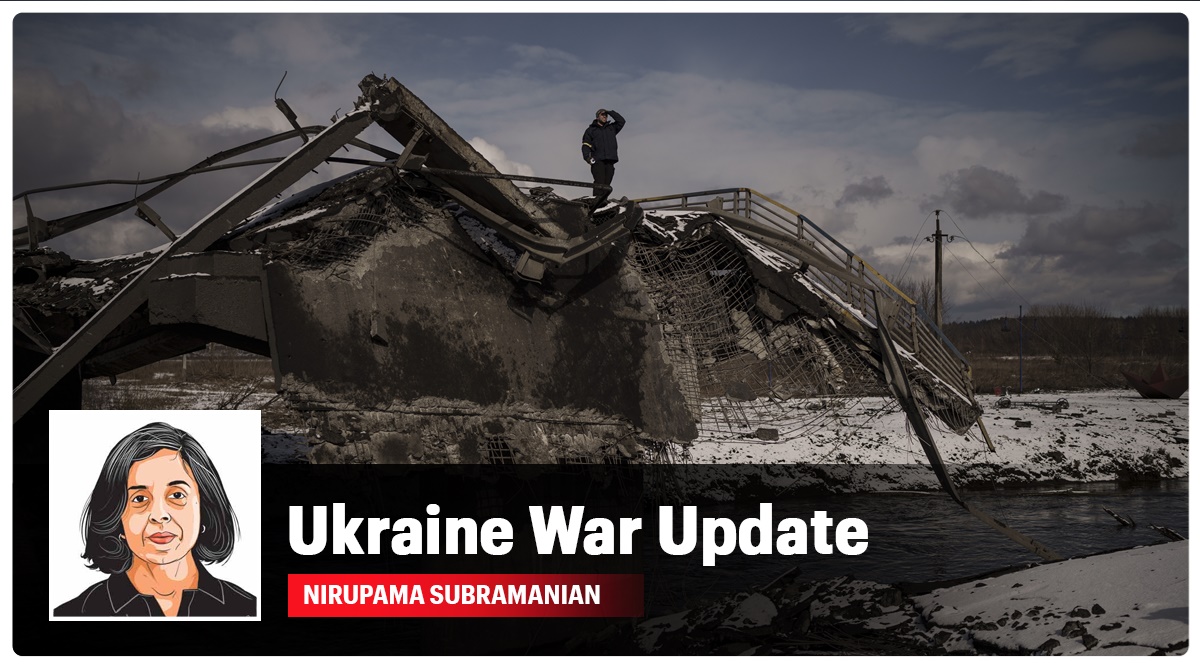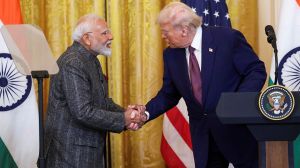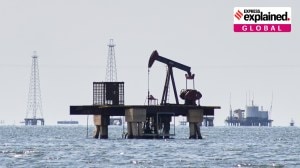Ukraine war update, March 9: How Europe deals with its dependence on Russian oil will be critical
Crude oil prices, which touched $128 a barrel for Brent on Tuesday, are expected to soar after US President Joe Biden announced a ban on all crude oil and natural gas imports from Russia into the US.
 A man stands atop a destroyed bridge in Irpin, on the outskirts of Kyiv on Tuesday. (Photo: AP)
A man stands atop a destroyed bridge in Irpin, on the outskirts of Kyiv on Tuesday. (Photo: AP)Today, March 9, is Day 14 of Russia’s invasion of Ukraine. Here’s what you need to know about the war right now.
Crude oil prices, which touched $128 a barrel for Brent on Tuesday, are expected to soar after US President Joe Biden announced a ban on all crude oil and natural gas imports from Russia into the US.
How dependent is India on Russia gas? Read here for awaits India.
How might this sanction play out in Europe? Is this a sanction that will divide Europe again after its massive show of unity following Russia’s invasion of Ukraine?
The United Kingdom has announced it will follow suit, but in Europe, there is bound to be concern.
German Chancellor Olaf Scholz had said on Monday that Russian oil and gas were essential to the daily lives of Europe.
“Supplying Europe with energy for heat generation, mobility, electricity supply and industry cannot be secured in any other way at the moment. It is therefore of essential importance for the provision of public services and the daily lives of our citizens,” he said cautioning against a ban on Russian energy.
🗞️ Subscribe Now: Get Express Premium to access the best Election reporting and analysis 🗞️
After Biden’s announcement, EU Commission Vice President Frans Timmermans said in tweets that the EU would reduce its fossil fuel dependence on Russia by about two-thirds this year, and become completely self-reliant by 2030. He also said it would hasten the EU’s transition to clean energy.
“Putin’s war in Ukraine demonstrates the urgency of accelerating our clean energy transition,” added Timmermans.
Almost all the gas used in Europe is imported, and Russia supplies some 40 per cent of this, and 30 per cent of EU’s oil requirement.
At the time of writing this newsletter, Scholz was yet to respond to Biden’s announcement.
Russian forces massed around Kyiv have still held off from launching an assault on the city
According to analysts, that may suggest the Russian Army does not have enough troop strength on the ground. Ukrainian forces including militias are continuing to mount a stiff resistance, keeping troops stretched.
While the war has already displaced nearly 2 million people, the Office of the High Commissioner for Human Rights said as of March 7, it had recorded 1,335 civilian casualties in Ukraine: 474 killed and 861 injured.
“A total of 474 killed (97 men, 54 women, 8 boys, and 4 girls, as well as 17 children and 294 adults whose sex is yet unknown). A total of 861 injured (76 men, 55 women, 11 girls, and 3 boys, as well as 30 children and 686 adults whose sex is yet unknown),” OCHR said
Little, however, is known about military casualties on the Russian and Ukrainian side, except what is claimed by either side.
Ukrainian military intelligence have said Ukrainian forces killed a top general, Vitaly Gerasimov, first deputy of Russia’s 41st army on Monday. Another general, also a deputy commander of the 41st Army, was reported killed at the end of February.
According to Reuters, Russia has confirmed it has lost 500 soldiers in this war. There is no word from Ukraine on its losses.
Ukraine hopes to join the European electricity grid ENTSO-E within a week and cut away from a grid that has Russia and Belarus
The synchronization process is in its final stages, according to a report in the Kyiv Independent, quoting a government press release.
The move is aimed at freeing Ukraine from electricity dependency on Russia,
“Technical preparations for the synchronization are nearing completion. It should be completed within the next few days. We expect our accession to take place in the next week,” Energy Minister Herman Galushchenko said.
The EU Energy Commissioner Kadri Simson had said in a tweet on February 28 that an emergency synchronisation was underway, and that he hoped it could continue uninterrupted by the invasion.
“I will ask ENTSO and the member states tomorrow for their support to complete the emergency synchronisation as quickly as possible.”
Simson said that she would seek support from other EU nations in establishing an emergency connection with Ukraine.
Meanwhile, two weeks on, how is this war going for Russia?
Russia’s invasion of Ukraine has spawned several endgame scenarios around the following questions: Is it going to be a long or short war? Is Vladimir Putin going to lose? Will he lose even if he wins?
Almost all analysts dissecting the war — they are all Western — agree that the longer it goes on, the more difficult it becomes for the Russian President to sustain the “operation” amid the sweeping sanctions that have already started hurting the country, and even more difficult to justify it back home.
Lawrence Freedman is among the foremost western strategic analysts. He says that the war is going rather badly for Putin. The Russian leader might have thought this would be a quick “operation”, but Ukraine has put a spanner in his plans.
Freedman sets out the analysis that Russian troops may have established a presence in some areas of Ukraine, but they have not established control in any of these areas, not to speak of the rest of the vast country where there is no Russian presence. Russian convoys got fragmented as Ukrainians misled them into wrong routes, blew up bridges to slow the advance and ambushed separated units.
Insufficient troop strength has prevented an assault on Kyiv, as commanders wait for supply gaps to be filled. Places where Russian commanders expected to be welcomed, such as Kherson and Kharviv, angry crowds of civilians have resisted the advance. Even less expected was that President Volodymyr Zelenskyy would be able to motivate his people to rise up as one in resistance against the invasion.
He argues in another piece that Putin’s agreeing to talk with the Ukrainians — three rounds of talks have been held in Belarus — is an acknowledgement that Russia would not succeed in imposing its version of peace on Ukraine, and would have to negotiate a ceasefire.
Indeed, few are betting this will end well for Putin. In an essay in Foreign Affairs the authors argue that even if Russia were to win the war on the ground, it would still end up being a loser. Putin would be up against an insurgency that would be sustained with a steady supply of weapons, money, food and medicines, and other humanitarian assistance by the West. Russia would need to support a proxy regime politically and financially at a time it is least able to do so, given the crippling effect of the US-led western sanctions.
The US is preparing for the long haul in Ukraine. President Biden said in his announcement cancelling the import of Russian oil on Tuesday night that “shipments of defensive weapons are arriving everyday from the United States” in Ukraine, and that the US was also co-ordinating deliveries from “Germany to Finland and the Netherlands”.
Could this lead to the war spilling out of Ukraine and spreading to other countries in Europe, and if so, what shape might this take?
There is not so much worry about a nuclear conflagration despite Putin’s ominous statements, as there is about a wider conventional or hybrid war, with fears of Russia hitting back through cyberattacks and by cutting off gas supplies preemptively before its European buyers make a decision.
Another prediction rests on the premise that many Russians are against the war, and as the sanctions begin to bite the average Russian citizen, Putin’s political survival would be at stake. It has been difficult to gauge the extent of the opposition to the war, though it does seem that most Russians were taken aback by the President’s decision to invade their smaller neighbour.
Some Russian analysts I spoke to earlier described it as “most unexpected” and “irrational”, but said western media narratives of opposition to the war did not reflect the ground situation. There has been some vocal opposition, but the sanctions against Russia could also lead to a surge of nationalism and a rallying around the leadership.
Asked by the BBC last week if the US was seeking regime change in Moscow, US Secretary of State Anthony Blinken had this to say: “We don’t seek that. In any event, it’s not up to us. The Russian people need to decide their leadership, they need to decide whether their leaders are actually advancing and representing their needs, their interests, their will… What I would say to the Russian people is how in the world is this war of aggression, unprovoked, unwarranted on Ukraine, how in the world is that advancing your interests, your needs? … It’s doing nothing for them. On the contrary, tragically, for the Russian people, they are bearing the burden of so much of this because the world has come together to put these massive sanctions on Putin and on Russia.”
Newsletter | Click to get the day’s best explainers in your inbox
- 01
- 02
- 03
- 04
- 05







































